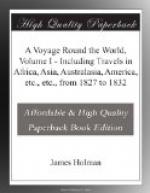On leaving the Queens’ Square, we were invited to go over the Duke’s English house, as it was called, which, in fact it was, having been sent out in frame, from Liverpool, with carpenters to erect it, by Mr. Bold, formerly a merchant of that town. This wooden edifice stood by the side of his mud hut, in which, by the bye, such was the force of habit, he preferred residing. In the English house there was a grand display of European articles, consisting of furniture, mirrors, pictures, a quantity of cut-glass on the sideboard, and to crown all, there was a large brass arm-chair, weighing 160 pounds, a present from Sir John Tobin, with an inscription engraved on it, to that effect.
About two o’clock we took leave of the Duke, and went on board the Kent, where the poor mate was lying dangerously ill, and we all apprehended the worst result, not having any medical man to dress the wound, or tell the exact nature of it. After dining with Captain Cumings, we returned to the Duke’s house, to learn if he had ascertained the name of the vessel the Frenchman commanded. The reply was unsatisfactory, as he still declared his ignorance on the subject. It is not unusual for the blacks (like the Chinese) to identify the ship in the Captain, for instance, if they want to speak of the Jane, Captain Brown, they say, ‘that Brown’s ship.’ It was, therefore, possible that the Duke might really have spoken the truth in protesting that the name of the vessel was unknown to him.
Finding there was nothing more to be done with the Duke that evening, we left him, with an assurance that we should persist in our demand of having either the Captain, or his vessel, delivered up to us; that we should go and report the circumstance to the Governor of Fernando Po, who would send a frigate to blockade the port, stop all the trade of the river, and perhaps come and burn the town. These threats were not apparently without their effect, although his Majesty was as much afraid of opposing the slavers, as he was of quarrelling with us. The following morning at daylight we left Duke’s Town, and proceeded down the river, not however, with the intention of going to Fernando Po, but merely to visit all the rivers between the Calabar and Cape Formosa, in quest of slavers, first going to the celebrated Bonny, off which river we arrived on Thursday, 31. Here we saw a brig at anchor, which proved to be the Neptune, of and from Liverpool. She had been lying here ten days, waiting for clear weather to enable her to pass the bar, and get into the river.
On the day we left Old Calabar town, I had all the symptoms of approaching fever, such as headache, foul tongue, hot and dry skin, loss of appetite, prostration of strength, &c. I, therefore, took calomel, and adopted prompt measures of regimen, abstaining from all food, taking nothing but diluents, keeping myself quiet, and occupying the mind with amusing thoughts. By following this practice, at the expiration of three days, I found myself quite convalescent, after which I soon recovered my former health and spirits.




